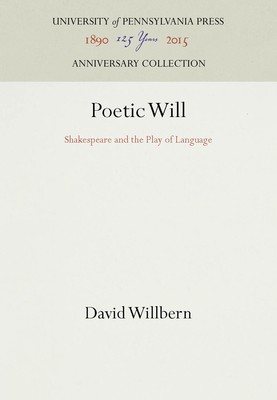
- We will send in 10–14 business days.
- Author: David Willbern
- Publisher: University of Pennsylvania Press Anniversary Collection
- ISBN-10: 0812233891
- ISBN-13: 9780812233896
- Format: 15.6 x 23.4 x 1.6 cm, kieti viršeliai
- Language: English
- SAVE -10% with code: EXTRA
Reviews
Description
The essence of Shakespeare, observes David Willbern, is in the details. What matters most in our appreciation of Hamlet is not the staged play but the play of language we find in the words of the Bard.
This book explores the expressions of Shakespeare's poetic will--his sexual desire, conscious and unconscious volition, and posthumous legacy--within the linguistic matrix that enfolds his characters and readers. Using a combination of psychoanalytic approaches, Willbern rescues Shakespeare from the limitations and distortions of dramatic performance by showing that his language, scenes, and characters are propelled by the genius of this will and need to be understood primarily as written narrative. In these provocative essays, Willbern examines the deep analogy between poetic creativity and sexual procreation as he explores the parallels between Shakespearean and Freudian representations of fantasy, thus offering readers a heightened awareness of the sexual and bodily substrate of Shakespeare's language. Engaging current debars between psychological and social approaches, he develops new strategies of reading in a search for the limits of Shakespeare's language and our responses to it. He then applies these strategies to all of Shakespeare's genres via detailed analysis of a comedy (Twelfth Night) a history (Henry IV, Part One) a tragedy (MacBeth) and a poem (Lucrece). Additional essays provide an overview of Shakespeare both as a creative agent and as a body of work. Questions of identity, authenticity, and representation-especially as posed in Hamlet--are a recurrent concern throughout the book. Poetic Will frees the play of language in Shakespeare from its illusory anchors in characters and resituates the experience of reading his work within individual response and reconstruction. Offering practical criticism with a bold, American slant, it emphasizes the rich potential of Shakespeare's poetic language while exploring the interpretive and rhetorical limits of psychoanalytic literary criticism.EXTRA 10 % discount with code: EXTRA
The promotion ends in 22d.08:29:02
The discount code is valid when purchasing from 10 €. Discounts do not stack.
- Author: David Willbern
- Publisher: University of Pennsylvania Press Anniversary Collection
- ISBN-10: 0812233891
- ISBN-13: 9780812233896
- Format: 15.6 x 23.4 x 1.6 cm, kieti viršeliai
- Language: English English
The essence of Shakespeare, observes David Willbern, is in the details. What matters most in our appreciation of Hamlet is not the staged play but the play of language we find in the words of the Bard.
This book explores the expressions of Shakespeare's poetic will--his sexual desire, conscious and unconscious volition, and posthumous legacy--within the linguistic matrix that enfolds his characters and readers. Using a combination of psychoanalytic approaches, Willbern rescues Shakespeare from the limitations and distortions of dramatic performance by showing that his language, scenes, and characters are propelled by the genius of this will and need to be understood primarily as written narrative. In these provocative essays, Willbern examines the deep analogy between poetic creativity and sexual procreation as he explores the parallels between Shakespearean and Freudian representations of fantasy, thus offering readers a heightened awareness of the sexual and bodily substrate of Shakespeare's language. Engaging current debars between psychological and social approaches, he develops new strategies of reading in a search for the limits of Shakespeare's language and our responses to it. He then applies these strategies to all of Shakespeare's genres via detailed analysis of a comedy (Twelfth Night) a history (Henry IV, Part One) a tragedy (MacBeth) and a poem (Lucrece). Additional essays provide an overview of Shakespeare both as a creative agent and as a body of work. Questions of identity, authenticity, and representation-especially as posed in Hamlet--are a recurrent concern throughout the book. Poetic Will frees the play of language in Shakespeare from its illusory anchors in characters and resituates the experience of reading his work within individual response and reconstruction. Offering practical criticism with a bold, American slant, it emphasizes the rich potential of Shakespeare's poetic language while exploring the interpretive and rhetorical limits of psychoanalytic literary criticism.

Reviews